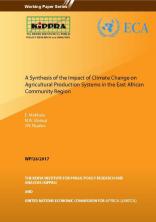WP26 Synthesis Climate Change and Agriculture Production

Agriculture is vulnerable to climate change especially in Africa where several studies have shown likely negative impacts. According to IPCC ifth assessment report, climate change is impacting regional climates and ecosystems (IPCC, 2014). Climate change has continued to alter conditions for agricultural production in Africa and thus food security. These observed changes are afecting precipitation, water availability, length of growing seasons, lood risks, incidences of extreme weather events, prevalence and distribution of human diseases.
Previous studies on climate change and agricultural production, such as Lotsch, (2007) and Barrios et al. (2008) indicate negative efects on livestock management and crop yields by up to 50 per cent in 2020. However, other global studies project increase in cereal production even under climate change (Parry et al., 2004; Fischer et al., 2005; Ludi et al., 2007). Countries in the East African Community continue to experience increasing climate variability, declining food production and hunger. This would further adversely afect food security and exacerbate malnutrition. However, crop models could be used to understand the efects of climate change on agricultural production and thus crop yield variability (Rosenzweig and Iglesias, 1994). This will enable countries to adapt their production techniques and productions to the new conditions. Further, being able to balance growing diferences between food demand and production in diferent regions of Africa due to climate change will mean paying greater attention to develop policies and regulations supporting agricultural production and trade, and putting in place the necessary infrastructure and institutions.